Table of Contents Show
There may be products. Products are independently selected by our editors. We may earn an affiliate commission from the links with no charge to you, example: as Amazon Affiliate.
We’ve curated the most impactful business books for 2025 that combine timeless wisdom with modern strategies. From Brandon Bornancin’s “Whatever It Takes” to Mike Ettore’s “Trust-Based Leadership,” these selections offer practical insights for both emerging entrepreneurs and seasoned leaders. We’ve included must-reads like “CEO Excellence” and “The 360 Degree Leader” that address critical areas from mindset development to team building. Let’s explore how these transformative titles can propel your business success to new heights.
Key Takeaways
- Books prioritizing digestible laws, relatable anecdotes, and practical guidance are essential for modern entrepreneurs seeking immediate business implementation.
- “CEO Excellence” offers vital leadership mindsets focusing on vision and resilience, making it crucial for aspiring business leaders.
- Successful business books combine real-world examples with specific action steps to ensure practical application of concepts.
- Selection should balance author credibility, industry relevance, and learning style compatibility for maximum reader benefit.
- Books like “Trust-Based Leadership” and “The Rugged Entrepreneur” provide structured methodologies for developing resilience and leadership skills.
Whatever It Takes: Master the Habits to Transform Your Business
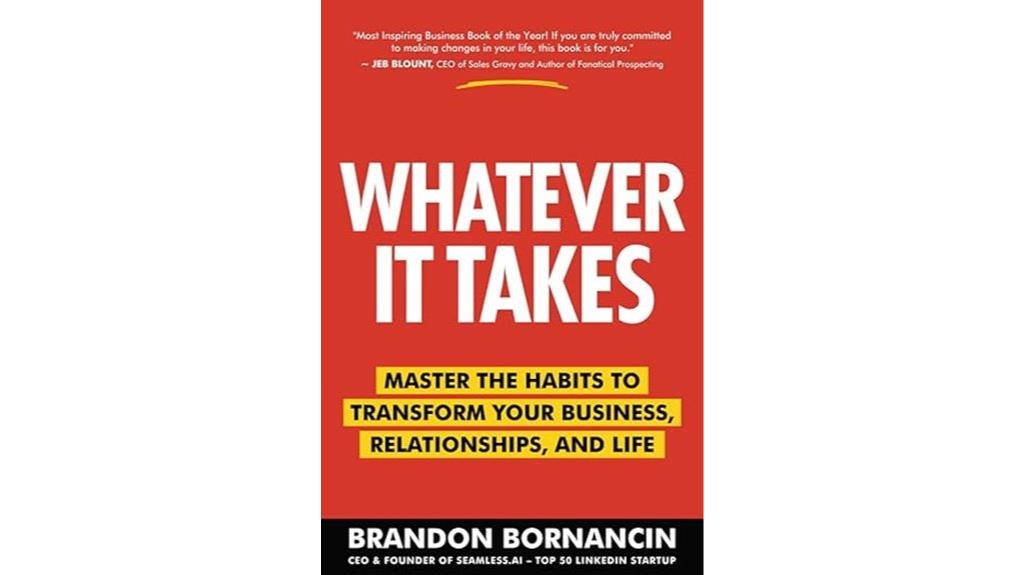
For entrepreneurs seeking a no-nonsense guide to business transformation, Brandon Bornancin’s “Whatever It Takes” delivers actionable strategies backed by real-world experience.
We love how this book cuts through the noise with its emphasis on building positive networks and embracing hard work. Bornancin’s direct writing style makes complex concepts accessible while reinforcing that success requires discipline and consistent effort. He reminds us that our network equals our net worth and staying around negative influences holds us back.
Through engaging anecdotes and practical advice, we’re shown exactly what it takes to transform our businesses without sugar-coating the journey. It’s a blueprint for those ready to leave excuses behind and commit to growth.
Best For: Ambitious entrepreneurs and business professionals seeking practical, no-nonsense strategies for business growth who are willing to put in the hard work required for transformation.
Pros:
- Direct, actionable advice based on real-world experience rather than theory
- Strong emphasis on the importance of building positive networks and relationships
- Clear, engaging writing style that makes complex concepts accessible and memorable
Cons:
- May be too direct or intense for those seeking a gentler approach to business development
- Heavy focus on hard work and discipline might not appeal to those looking for quick solutions
- Repetitive reinforcement of key concepts could feel redundant to some readers
CEO Excellence: Six Mindsets of Best Leaders
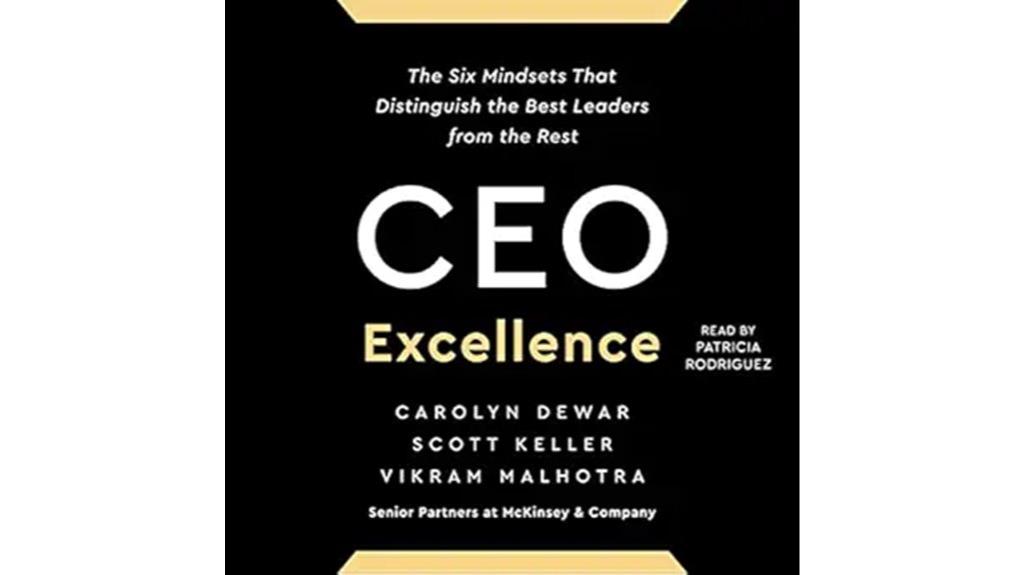
Leaders seeking to elevate their performance will find invaluable insights in “CEO Excellence: The Six Mindsets That Distinguish the Best Leaders from the Rest.” We particularly recommend this research-backed guide to executives and aspiring CEOs who want to understand the core mindsets driving exceptional leadership.
Drawing from extensive interviews with successful CEOs, the book explores vision, accountability, resilience, collaboration, humility, and authenticity. What sets it apart is its evidence-based approach and real-world applications. We’re impressed by how it addresses the personal challenges of leadership, including the loneliness at the top, while providing actionable strategies for effective business management. It’s an essential read that transforms common sense into practical wisdom.
Best For: CEOs, aspiring executives, and senior managers seeking evidence-based leadership insights backed by real-world experiences from successful business leaders.
Pros:
- Strong research foundation with insights drawn from extensive interviews with successful CEOs
- Practical, actionable advice that transforms leadership theory into implementable strategies
- Balanced approach addressing both professional strategies and personal challenges of leadership
Cons:
- May be too focused on high-level executive perspectives for entry-level managers
- Some concepts might seem like common sense to experienced leaders
- Limited coverage of leadership challenges in smaller organizations or startups
The 360 Degree Leader: Developing Your Influence
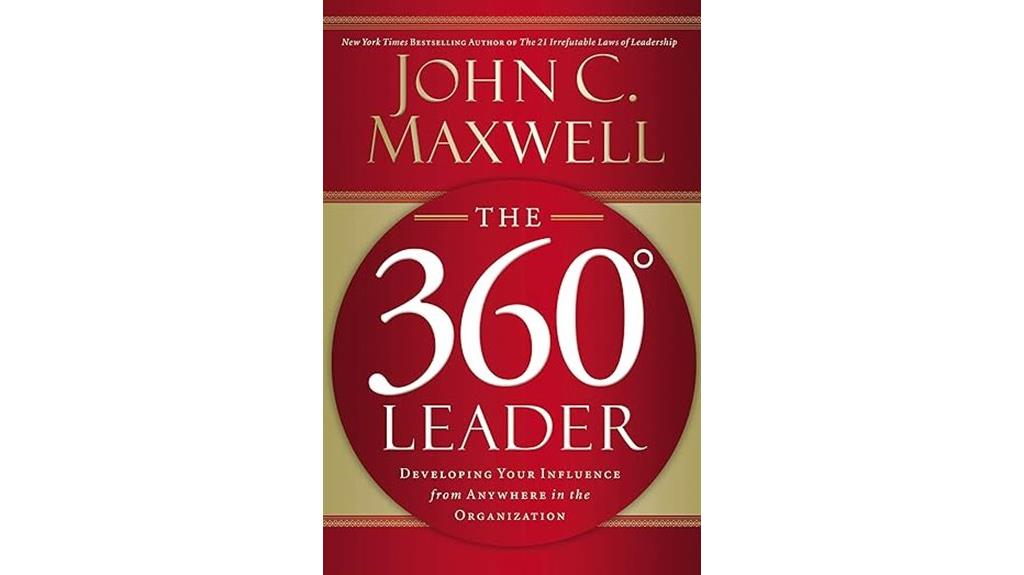
Mastering influence at every organizational level sits at the heart of John Maxwell’s “The 360 Degree Leader.” This extensive guide breaks down the misconception that leadership belongs exclusively to those at the top, showing how middle managers and team members can effectively lead up, across, and down.
Drawing from over three decades of experience, Maxwell delivers practical insights through bite-sized chapters and real-world examples. We love how the book’s organized structure makes complex leadership principles digestible and immediately applicable. Whether you’re feeling stuck in your career or aiming to expand your influence, you’ll find actionable strategies that work in any organizational context.
Best For: Middle managers, aspiring leaders, and professionals seeking to develop their leadership influence regardless of their position in the organizational hierarchy.
Pros:
- Practical, actionable advice organized in easy-to-digest chapters
- Real-world examples and stories that illustrate complex leadership principles
- Comprehensive framework for leading in all directions (up, down, and across)
Cons:
- Some concepts may feel repetitive throughout the book
- May not provide enough depth for experienced senior leaders
- Limited focus on modern leadership challenges in digital environments
Trust-Based Leadership: Marine Corps Concepts for Business Leaders
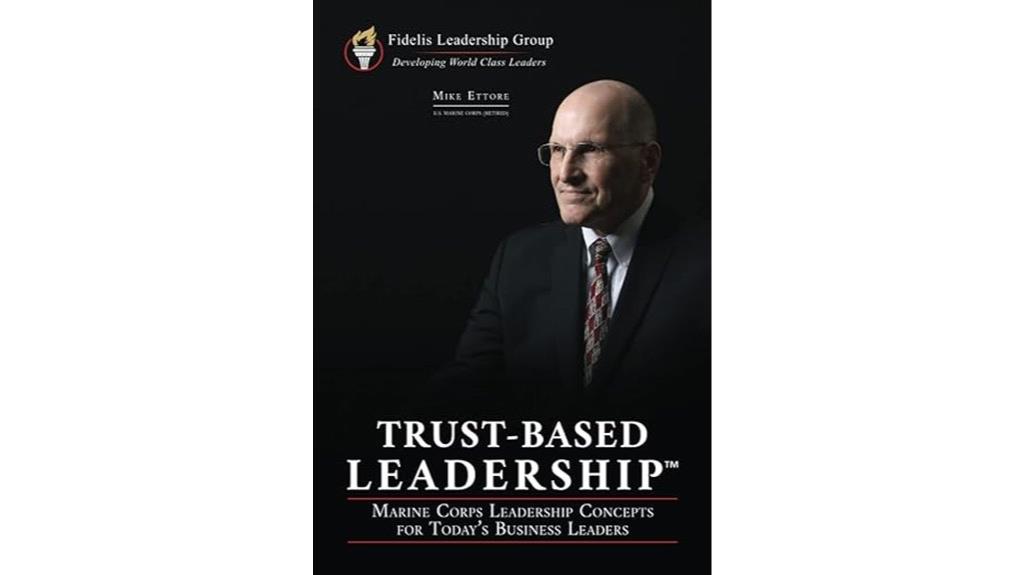
The transformative impact of Marine Corps leadership principles shines through in Mike Ettore’s “Trust-Based Leadership,” making it an invaluable resource for entrepreneurs seeking to build high-performing teams.
Drawing from his experience as both a Marine and civilian executive, Ettore presents 24 essential rules that we’ve found particularly effective for developing authentic leadership skills. His practical approach bridges military discipline with business acumen, offering a proven framework we can apply to strengthen our organizations. We’re especially impressed by how the book serves as a continuous learning tool, reminding us that true leadership development never ends.
Best For: Military veterans, business leaders, and aspiring managers seeking practical leadership principles drawn from Marine Corps experience that can be applied in civilian organizations.
Pros:
- Provides 24 clear, actionable leadership rules based on real-world military and business experience
- Effectively bridges military leadership principles with business applications
- Serves as an ongoing reference guide for continuous leadership development
Cons:
- Military-centric approach may not resonate with all business readers
- Focus on Marine Corps experience might limit broader leadership perspectives
- May oversimplify complex business leadership challenges through military framework
The Rugged Entrepreneur: What Every Disruptive Business Leader Should Know
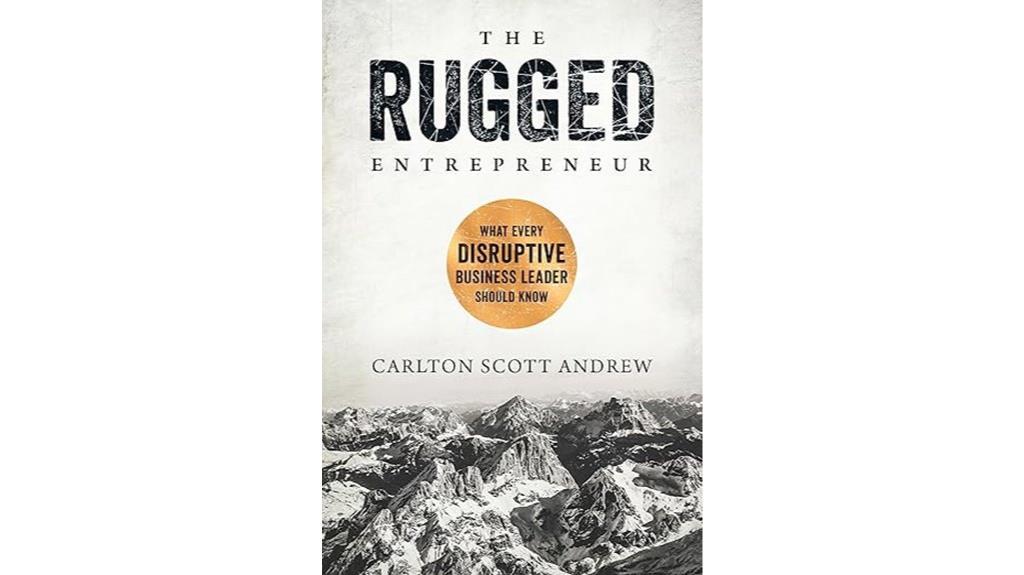
Rugged determination and unwavering resilience mark Carlton Scott Andrew’s essential guide for disruptive business leaders. Drawing from 25 years of diverse business experience, Andrew outlines four vital elements: work ethic, rugged pride, mental toughness, and faith in ideas.
We’re particularly impressed by his R.A.I.S.E.M.E methodology for building mental fortitude and his practical approach to leadership development. Through compelling anecdotes featuring business titans like Warren Buffet and practical exercises, Andrew shows us how to eliminate excuses and build the mindset needed for entrepreneurial success. His actionable advice on early rising, networking, and daily routines makes this book invaluable for today’s business leaders.
Best For: Aspiring entrepreneurs and business leaders seeking practical, no-nonsense guidance on developing mental toughness and foundational leadership skills.
Pros:
- Provides concrete, actionable advice rather than just theoretical concepts
- Includes practical exercises and methodologies like R.A.I.S.E.M.E for mental toughness
- Combines personal experience with inspiring stories from successful business leaders
Cons:
- May be too focused on traditional “tough it out” mentality for some readers
- Lacks detailed technical or strategic business planning guidance
- Some readers might find the emphasis on personal anecdotes excessive
The Diary of a CEO: The 33 Laws of Business and Life
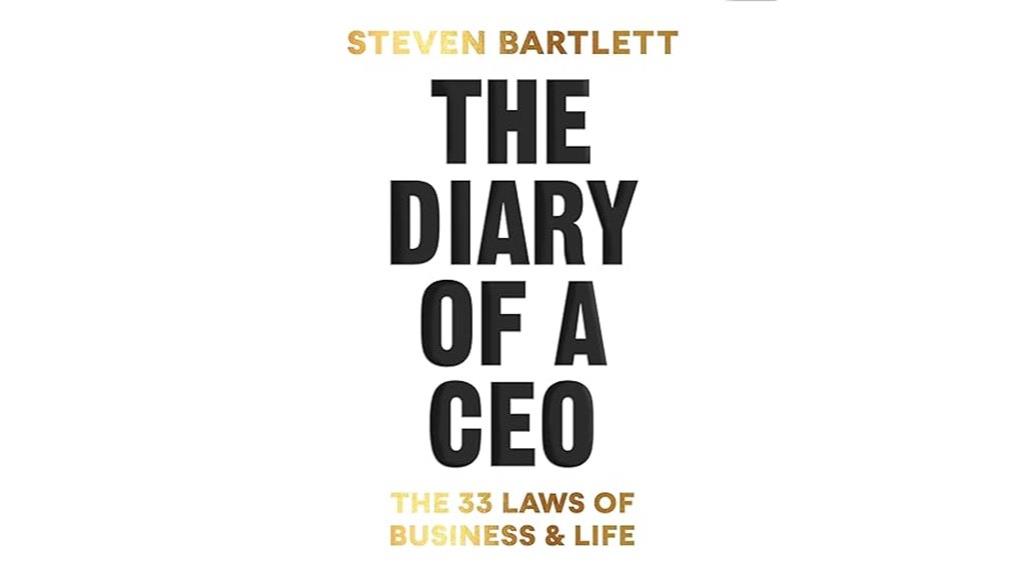
Written by successful entrepreneur Steven Bartlett, “The Diary of a CEO: The 33 Laws of Business and Life” delivers actionable wisdom for both seasoned and aspiring business leaders who want to blend professional success with personal growth.
We appreciate how Bartlett breaks down complex business and life principles into 33 digestible laws, using his mentor-like approach and relatable anecdotes. While some may find the advice surface-level, we’ve found the book’s accessibility makes it particularly valuable for younger entrepreneurs seeking practical guidance. Available in both print and audio formats, it’s an energizing resource you can return to repeatedly for inspiration and refocusing your goals.
Best For: Aspiring entrepreneurs and young professionals seeking accessible business wisdom and personal development guidance in an easy-to-digest format.
Pros:
- Clear, concise presentation of business and life principles through 33 actionable laws
- Relatable writing style with personal anecdotes that resonate particularly well with younger readers
- Available in multiple formats and serves as an ongoing resource for motivation and refocusing
Cons:
- Some advice may seem surface-level or obvious to experienced business leaders
- Writing quality is inconsistent throughout the book
- May lack the depth needed for comprehensive business strategy or personal transformation
The Lean Startup: How to Create Successful Businesses
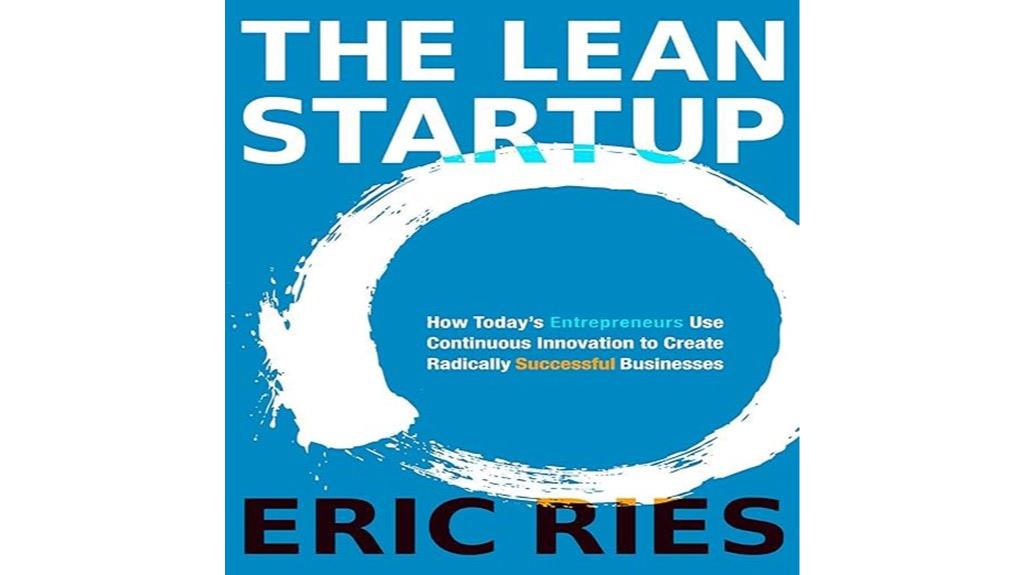
Modern entrepreneurs seeking a proven methodology for business success will find invaluable guidance in “The Lean Startup” by Eric Ries.
Through his customer-centric approach, Ries introduces the build-measure-learn feedback loop, emphasizing rapid iteration and validated learning over traditional market research. We’re particularly impressed by how the book breaks down startup development into three essential phases: Vision, Steer, and Accelerate.
What makes this book stand out is its practical application of minimum viable products (MVPs) to test customer interactions. Whether you’re launching a new venture or innovating within an established company, you’ll discover how to eliminate waste and make data-driven decisions that align with real customer needs.
Best For: Entrepreneurs, startup founders, and business leaders seeking a systematic, data-driven approach to building and scaling successful ventures while minimizing waste and maximizing customer value.
Pros:
- Provides a clear, actionable framework through the build-measure-learn feedback loop
- Offers numerous real-world examples and case studies that illustrate the principles in practice
- Applicable to both new startups and established companies looking to innovate
Cons:
- May be too focused on technology and software-based businesses for some readers
- Some concepts can feel repetitive throughout the book
- Implementation of the methodology requires significant organizational buy-in and cultural change
Teen Entrepreneurship: The #1 Book for Teenage Entrepreneurs
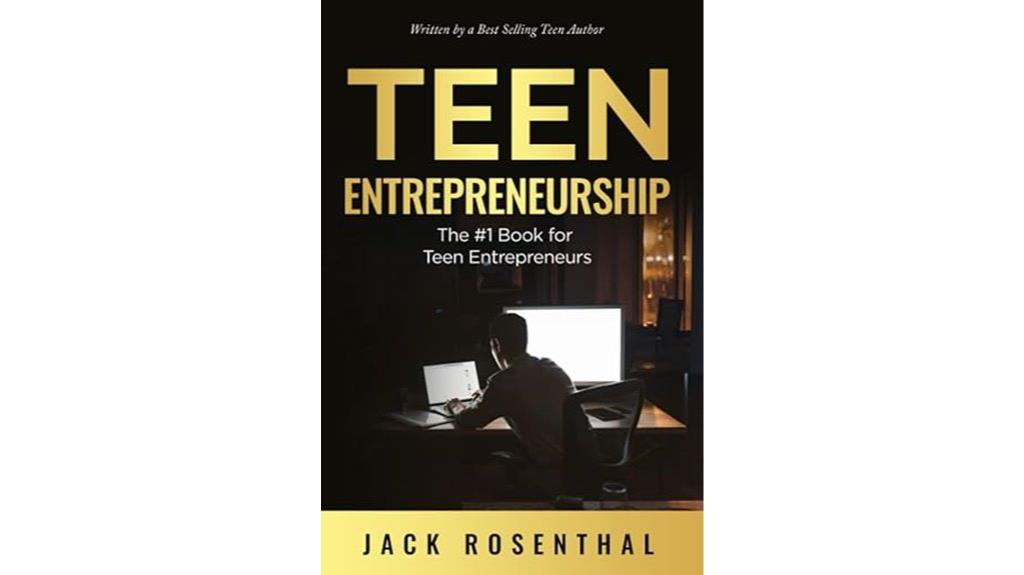
Young entrepreneurs seeking guidance will find invaluable wisdom in Jack Rosenthal’s “Teen Entrepreneurship: The #1 Book for Teenage Entrepreneurs.” While many business books focus on corporate strategy or advanced concepts, this guide speaks directly to teenage readers through relatable experiences and actionable advice.
What sets this book apart is its practical approach. Through Rosenthal’s personal stories, including his vending machine business and young investor’s club, readers learn from real-world examples. Each chapter includes interactive elements and supplementary resources, making it easy to implement lessons immediately. We’ve found that parents and teens alike praise its clarity and motivational impact, making it an essential read for aspiring young business leaders.
Best For: Teenage readers (13-19) who are interested in starting their own business and want practical, relatable guidance from someone who has experience as a young entrepreneur.
Pros:
- Written specifically for teens with age-appropriate examples and language
- Includes practical, actionable steps at the end of each chapter
- Provides supplementary resources and links for deeper learning
Cons:
- May be too basic for teens who already have business experience
- Focuses primarily on the author’s personal experiences
- Limited coverage of more complex business concepts and strategies
Social Entrepreneurship and Innovation Management Handbook for Business Leaders
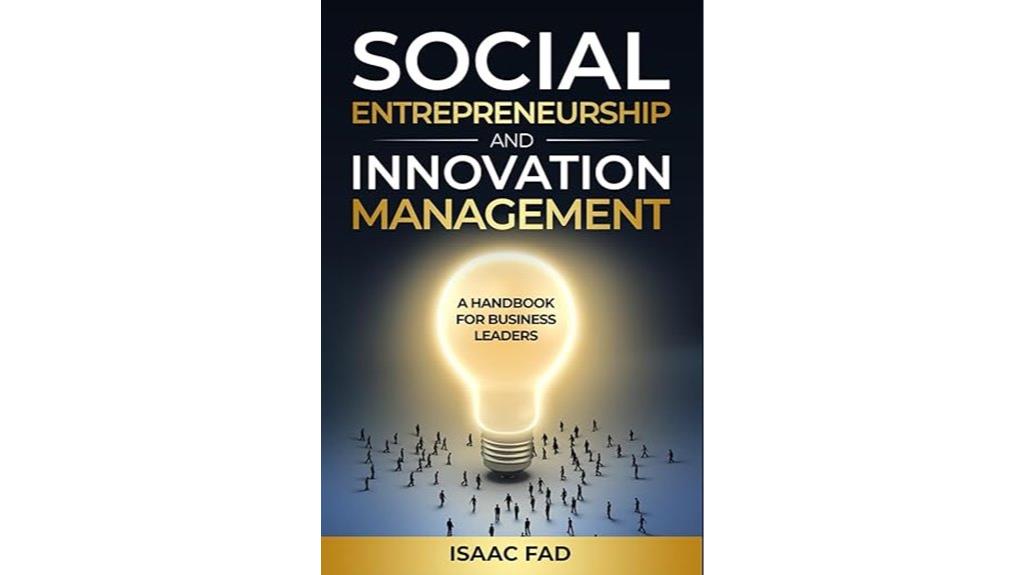
Business leaders seeking to create lasting social change while maintaining profitability will find invaluable guidance in “Social Entrepreneurship and Innovation Management” by Isaac Fad.
We’re impressed by how this handbook balances theory with practical strategies, making it essential for both seasoned professionals and newcomers. It’s packed with actionable insights on scaling social enterprises, attracting investors, and aligning innovations with SDGs. The focus on the Triple Bottom Line and sustainable leadership provides a robust framework for building purpose-driven ventures.
Whether you’re a student, educator, or practitioner, you’ll discover clear steps for maneuvering today’s complex social entrepreneurship landscape while driving meaningful impact.
Best For: Business leaders, entrepreneurs, and students seeking to create social impact while building sustainable and profitable ventures.
Pros:
- Comprehensive balance of theoretical concepts and practical, actionable strategies
- Rich with real-world examples and case studies that illustrate key concepts
- Clear framework for implementing Triple Bottom Line principles and sustainable leadership
Cons:
- May be too academic for entrepreneurs seeking quick, hands-on solutions
- Focus on theoretical foundations might overwhelm readers looking for immediate implementation
- Could benefit from more coverage of emerging technologies and digital innovation strategies
Leaders Eat Last: Why Some Teams Pull Together and Others Dont
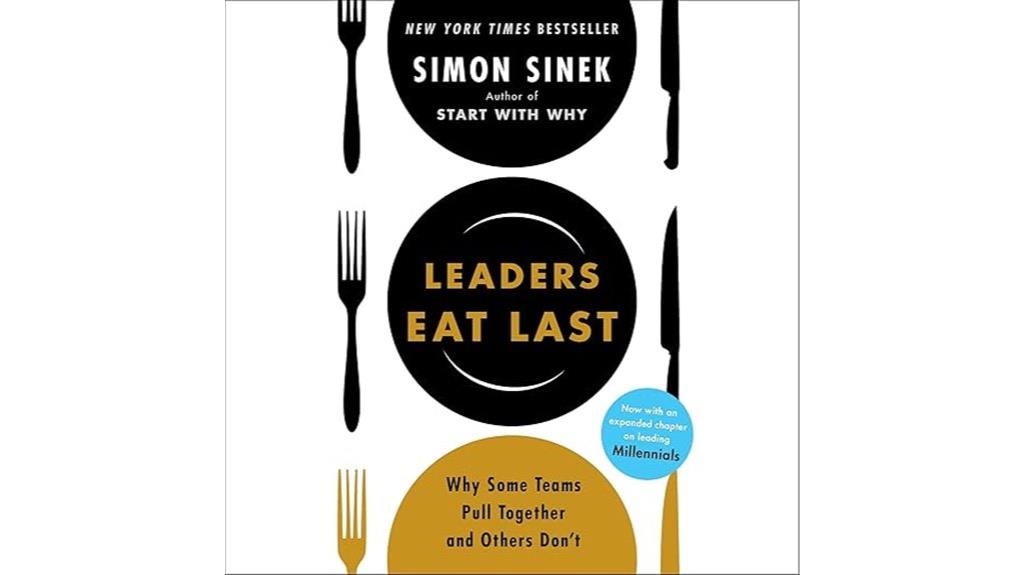
Driven entrepreneurs seeking to build cohesive, high-performing teams will find invaluable wisdom in Simon Sinek’s “Leaders Eat Last.” This influential work explores the biological and psychological foundations of effective leadership, explaining why some organizations thrive while others falter.
We’re particularly drawn to Sinek’s insights on how brain chemicals like oxytocin and serotonin influence workplace dynamics. His practical approach shows us that when leaders prioritize employee well-being and create a “circle of safety,” teams naturally pull together. By fostering trust, cooperation, and genuine care for team members, we can build organizations where people feel valued and motivated to perform their best.
Best For: Business leaders, entrepreneurs, and managers seeking to build stronger teams through trust-based leadership practices and improved workplace culture.
Pros:
- Provides clear biological explanations for how leadership behaviors affect team dynamics
- Offers practical, actionable insights for creating a supportive work environment
- Balances theoretical concepts with real-world examples and applications
Cons:
- Some concepts can feel repetitive throughout the book
- May oversimplify complex organizational challenges
- Limited focus on specific industries or different sized organizations
Factors to Consider When Choosing Business Books for Aspiring Entrepreneurs and Leaders
When selecting business books, we must first evaluate the author’s expertise and real-world success to guarantee we’re learning from credible sources who’ve actually accomplished what they teach. We’ll want to balance practical, actionable advice with theoretical frameworks, while considering how well the book’s teaching approach matches our preferred learning style. The ideal book should align with both our industry focus and current career stage, whether we’re just starting out or scaling an established venture.
Author Expertise and Credibility
Selecting the right business books starts with evaluating the author’s expertise and credibility. We recommend looking for authors who’ve demonstrated real-world success through their entrepreneurial ventures or leadership roles. Their years of industry experience often translate into practical, actionable advice that you can apply to your business journey.
When appraising an author’s credibility, we encourage you to examine their educational background, professional achievements, and contributions to their field. Check if they’ve led successful companies, introduced innovative solutions, or achieved significant milestones in their careers. It’s also worth reading reviews from readers who’ve implemented the author’s strategies – their feedback can validate the effectiveness of the concepts presented and confirm the author’s standing in the business community.
Practical Vs Theoretical Content
The key distinction between practical and theoretical business books shapes their value for aspiring entrepreneurs. We recommend focusing on books that offer actionable steps and real-world applications you can implement immediately in your business. While theoretical frameworks provide important foundational knowledge, they often lack the hands-on guidance needed for day-to-day operations.
Look for books that embrace the “build-measure-learn” approach and include concrete strategies backed by relatable case studies. These practical resources encourage experimentation and learning through action, which is essential for entrepreneurial success. When selecting your next business book, evaluate the balance between theory and practice. The best choices will offer immediate applicability to your specific business context while inspiring confidence through proven, actionable methodologies.
Learning Style Compatibility
Smart entrepreneurs recognize that their learning style plays a significant role in absorbing and implementing business knowledge effectively. We’ve found that matching books to your preferred learning style can dramatically improve your comprehension and retention.
If you’re a visual learner, look for books rich in diagrams and infographics. For auditory learners, we recommend selecting titles available as audiobooks to maximize your learning during commutes or workouts. Those who learn best through reading and writing should focus on books with thorough written explanations and case studies. Meanwhile, if you’re a kinesthetic learner, prioritize books offering hands-on exercises and actionable frameworks.
Industry-Specific Knowledge Focus
When diving into business literature, entrepreneurs must prioritize books that align with their specific industry to maximize learning impact and practical application. We’ve found that industry-focused books offer invaluable case studies and real-world examples that directly relate to your sector’s unique challenges and opportunities.
Career Stage Relevance
Building on the value of industry knowledge, matching business books to your career stage represents a key factor in maximizing their impact on your entrepreneurial journey. We’ve found that early-stage entrepreneurs thrive with practical guides focusing on foundational skills and resilience, while seasoned leaders need advanced insights into innovation and team management.
When selecting your next business book, we recommend evaluating where you are in your career path. If you’re just starting, look for action-oriented content that builds core competencies. For established leaders, seek books that address complex challenges like scaling operations or shaping corporate culture. The most effective learning comes from materials that speak directly to your current situation and future aspirations. Your choice should reflect both your immediate needs and long-term leadership development goals.
Time Investment Required
Time represents an essential factor when selecting the right business books for your entrepreneurial journey. We recommend evaluating both the book’s length and structure before committing to a read. Most business titles range from 200 to 300 pages, typically requiring 5 to 10 hours of focused reading.
We’ve found that books with well-organized chapters and clear summaries can greatly reduce your learning curve. Look for titles that offer actionable insights and practical examples you can implement immediately. Don’t forget to factor in any supplementary materials or exercises that might extend your reading time but enhance your understanding.
To maximize your time investment, we suggest choosing books that align directly with your current business needs and goals. This targeted approach guarantees you’ll gain relevant knowledge you can apply right away.
Conclusion
We’ve shared these transformative business books to help you navigate leadership challenges in 2025 and beyond. Studies show that 85% of successful CEOs read at least one book per month, demonstrating how essential continuous learning is for business growth. Whether you’re a seasoned leader or an aspiring entrepreneur, these selections will equip you with the knowledge and mindsets needed to excel in today’s dynamic business landscape.








